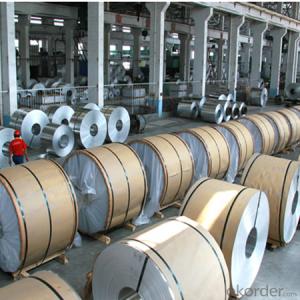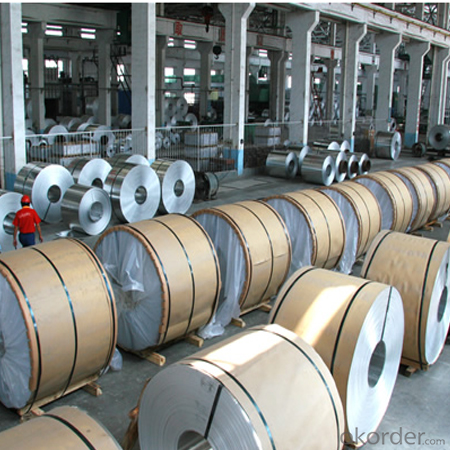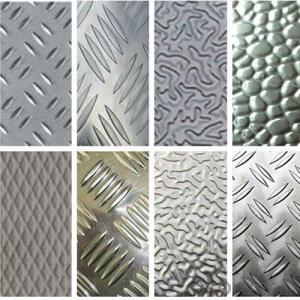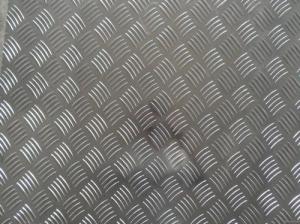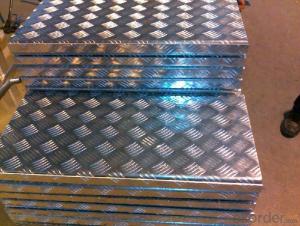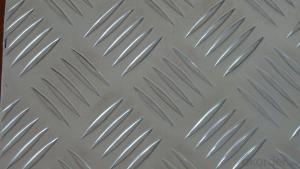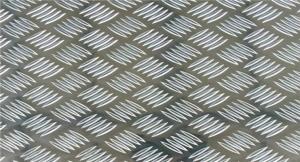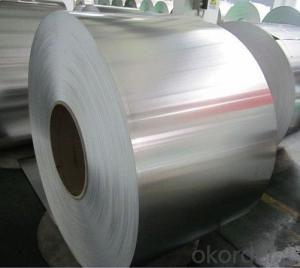Clad Aluminum Coil 5mm 6mm 7mm Corrosion Resistance Flooring Sheet Aluminium Checker Plat
- Loading Port:
- Shanghai
- Payment Terms:
- TT OR LC
- Min Order Qty:
- 5 m.t.
- Supply Capability:
- 5000 m.t./month
OKorder Service Pledge
Quality Product, Order Online Tracking, Timely Delivery
OKorder Financial Service
Credit Rating, Credit Services, Credit Purchasing
You Might Also Like
Specification
Grade:
1000 Series,5000 Series,7000 Series,3000 Series
Surface Treatment:
Embossed,Anodized,Mill Finish,Color Coated,Oxidized,Printed
Shape:
Angle,Flat
Temper:
T3-T8,Soft,Half Hard
Application:
Decorations,Transportation Tools,Kitchen Use,Pharmaceutical
Technique:
Extruded
Thickness:
0.05-4.0mm
Width:
900--1500mm
Outer Diameter:
450-600
Net Weight (kg):
2.5 ton
Packaging:
Wooden pallets
5mm 6mm 7mm Corrosion Resistance Flooring Sheet Aluminium Checker Plat
Packaging & Delivery
Product Specification | |
Grade | 1000 Series: 1050 1060 1100 3000 Series: 3003 3004 3105 5000 Series: 5052 5605,5083 6000 Series: 6061 6063 8000 Series: 8011 8021 8079 |
Thickness | 0.20-8.00mm |
Width | 2400mm max. |
Grade | 1000,3000,5000,6000,8000series |
Coil ID | 75mm, 150mm, 200mm, 300mm, 400mm, 508mm or negotiable |
Coil weight | 1000-5000kgs |
Coil OD | 1700mm max. |
Temper | O, H12, H14, H16, H111, H22 ,H24, H26, H28,T4, T6,etc. |
| Temper | |
| F | processing state |
| H | strain hardening state |
| O | annealing |
| T | heat treatment state |
| H112 | pure state of strain hardening, adjustment has been made to degree of strain hardening and annealing |
| T4 | solid solution treatment and natural efficiency to achieve sufficient stability condition |
| T5 | artificial aging condition of the reentry after high temperature thermal cooling |
| T6 | artificial aging state after solid solution treatment |
Chemical Composition | |||||||||
| Grade | Si | Fe | Cu | Mn | Mg | Cr | Ni | Zn | Al |
| 1050 | 0.25 | 0.4 | 0.05 | 0.05 | 0.05 | - | - | 0.05 | 99.5 |
| 1060 | 0.25 | 0.35 | 0.05 | 0.03 | 0.03 | - | - | 0.05 | 99.6 |
| 1070 | 0.2 | 0.25 | 0.04 | 0.03 | 0.03 | - | - | 0.04 | 99.7 |
| 1100 | Si+Fe:0.95 | 0.05-0.2 | 0.05 | - | - | 0.1 | - | 99 | |
| 1200 | Si+Fe:1.00 | 0.05 | 0.05 | - | - | 0.1 | 0.05 | 99 | |
| 1235 | Si+Fe:0.65 | 0.05 | 0.05 | 0.05 | - | 0.1 | 0.06 | 99.35 | |
| 3003 | 0.6 | 0.7 | 0.05-0.2 | 1.0-1.5 | - | - | - | 0.1 | remains |
| 3004 | 0.3 | 0.7 | 0.25 | 1.0-1.5 | 0.8-1.3 | - | - | 0.25 | remains |
| 3005 | 0.6 | 0.7 | 0.25 | 1.0-1.5 | 0.20-0.6 | 0.1 | - | 0.25 | remains |
| 3105 | 0.6 | 0.7 | 0.3 | 0.30-0.8 | 0.20-0.8 | 0.2 | - | 0.4 | remains |
| 3A21 | 0.6 | 0.7 | 0.2 | 1.0-1.6 | 0.05 | - | - | 0.1 | remains |
| 5005 | 0.3 | 0.7 | 0.2 | 0.2 | 0.50-1.1 | 0.1 | - | 0.25 | remains |
| 5052 | 0.25 | 0.4 | 0.1 | 0.1 | 2.2-2.8 | 0.15-0.35 | - | 0.1 | remains |
| 5083 | 0.4 | 0.4 | 0.1 | 0.40-1.0 | 4.0-4.9 | 0.05-0.25 | - | 0.25 | remains |
| 5154 | 0.25 | 0.4 | 0.1 | 0.1 | 3.1-3.9 | 0.15-0.35 | - | 0.2 | remains |
| 5182 | 0.2 | 0.35 | 0.15 | 0.20-0.50 | 4.0-5.0 | 0.1 | - | 0.25 | remains |
| 5251 | 0.4 | 0.5 | 0.15 | 0.1-0.5 | 1.7-2.4 | 0.15 | - | 0.15 | remains |
| 5754 | 0.4 | 0.4 | 0.1 | 0.5 | 2.6-3.6 | 0.3 | - | 0.2 | remains |
| 6061 | 0.40-0.8 | 0.7 | 0.15-0.40 | 0.15 | 0.8-1.2 | 0.04-0.35 | - | 0.25 | remains |
| 6063 | 0.20-0.6 | 0.35 | 0.1 | 0.1 | 0.45-0.9 | 0.1 | - | 0.1 | remains |
| 6082 | 0.7-1.3 | 0.5 | 0.1 | 0.40-1.0 | 0.6-1.2 | 0.25 | - | 0.2 | remains |
| 6A02 | 0.50-1.2 | 0.5 | 0.20-0.6 | Or Cr0.15-0.35 | 0.45-0.9 | - | - | 0.2 | remains |
| 8011 | 0.50-0.9 | 0.6-1.0 | 0.1 | 0.2 | 0.05 | 0.05 | - | 0.1 | remains |
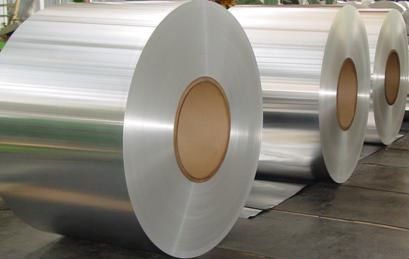
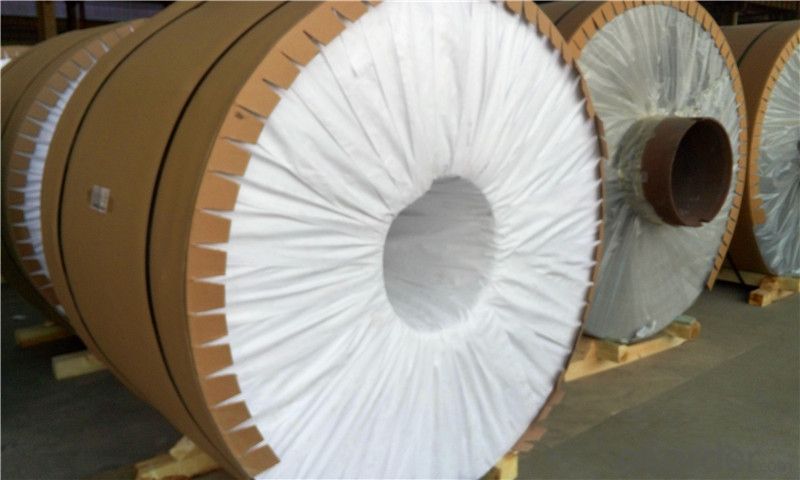
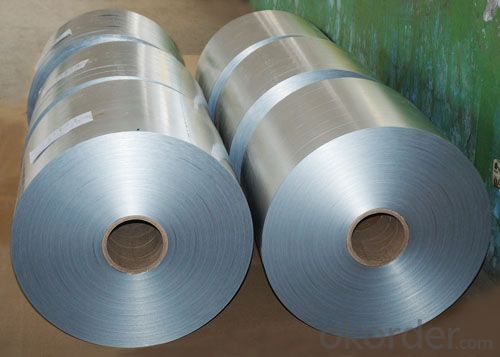
- Q: Can aluminum coils be painted or coated with different colors?
- Aluminum coils have the capacity to be painted or coated with a variety of colors. Aluminum, being a versatile material, can be easily painted or coated to achieve the desired aesthetic appearance. The coil can undergo pre-painting or coating prior to being shaped, or it can be painted or coated after being shaped. There are different methods available to apply the paint or coating, such as spraying, rolling, or dipping. Moreover, there are numerous options for paint or coating, including powder coating, liquid paint, or anodizing, which can offer different colors, finishes, and levels of durability. In summary, painting or coating aluminum coils is a widespread practice that improves their appearance and safeguards them from corrosion or other environmental factors.
- Q: Can aluminum coils be used for architectural applications?
- Yes, aluminum coils can be used for architectural applications. Aluminum is a versatile and lightweight material that is commonly used in construction due to its durability, corrosion resistance, and ease of installation. It can be formed into coils and used for various architectural elements such as roofing, cladding, facades, gutters, and window frames.
- Q: How are aluminum coils coated or finished?
- Various methods can be employed to coat or finish aluminum coils, enhancing their aesthetic appeal, protecting against corrosion, and improving functionality. The most common techniques include painting, anodizing, and laminating. Painting, a popular coating method, involves the application of a paint layer onto the aluminum surface. This can be accomplished using various techniques such as spray painting, roll coating, or coil coating. Customization options for the paint include color, gloss level, and texture, offering a wide range of aesthetic possibilities. Additionally, painting provides protection against atmospheric conditions and increases coil durability. Anodizing, another widely utilized technique, particularly in architectural and industrial applications, entails the creation of a controlled oxide layer on the aluminum surface through an electrochemical process. Anodized aluminum coils possess a uniform and durable finish, enhancing resistance to corrosion, scratching, and fading. They are available in various colors and can be further enhanced with a matte, brushed, or polished appearance. Laminating involves the application of a thin protective film onto the aluminum coil's surface. This film can be composed of materials such as PVC, polyester, or polyethylene. Laminating offers an additional layer of protection against scratches, dirt, and UV radiation. It also facilitates easy cleaning and maintenance of the coated aluminum coils. Besides these methods, specialized finishes can be applied to aluminum coils for specific applications. For instance, coils employed in the automotive industry may feature a polymer-based coating, enhancing lubricity and reducing friction. Coils used in the construction sector may incorporate a heat-reflective coating to improve energy efficiency. In conclusion, the coating or finishing of aluminum coils plays a vital role in enhancing their appearance, protecting against corrosion, and improving functionality for diverse applications. The choice of coating method depends on desired outcomes, budget, and specific requirements within the end-use industry.
- Q: Are aluminum coils suitable for food storage containers?
- Yes, aluminum coils are suitable for food storage containers. Aluminum is a non-toxic and non-reactive metal that is safe for storing food. It is lightweight, durable, and has excellent temperature retention properties, making it a popular choice for food storage containers.
- Q: This question asks about the impact of aluminum coils on cooking equipment, including their role in heat distribution and potential benefits or drawbacks.
- <p>Aluminum coils in cooking equipment play a significant role in heat distribution and retention. They are known for their excellent thermal conductivity, which allows for even heat distribution across the cooking surface, reducing hot spots and ensuring consistent cooking results. Aluminum's lightweight and malleability also make it easy to shape into various forms, fitting different types of cookware. However, aluminum can react with acidic foods, potentially altering the taste or releasing small amounts of aluminum into the food, which some studies suggest could have health implications. Additionally, aluminum cookware requires careful handling to avoid scratches that can compromise its performance and appearance.</p>
- Q: Describe the various uses of aluminum coils in the manufacturing industry.
- <p>Aluminum coils are widely used in manufacturing due to their lightweight, corrosion resistance, and strength. They are utilized in the production of various products such as automotive parts, aerospace components, and construction materials. Aluminum coils are also employed in the manufacturing of electrical wiring, heat exchangers, and packaging materials. Additionally, they are used in the production of cans and foils for food and beverage industries. Their versatility makes aluminum coils an essential material in many manufacturing processes.</p>
- Q: What are the differences among various types of steel wires and their respective coiling techniques?
- <p>Yes, there are differences between different types of steel wires and their coiling methods. Steel wires can be categorized based on their composition, strength, and use, such as carbon steel, stainless steel, and alloy steel wires. Each type has unique properties that affect their coiling methods. For instance, carbon steel wires are strong and ductile, suitable for standard coiling techniques, while stainless steel wires offer corrosion resistance and may require special handling to prevent damage. The coiling methods also vary; some common ones include spool coiling, loop coiling, and pancake coiling. Each method has specific applications and considerations for wire diameter, tension, and storage. Understanding these differences is crucial for selecting the appropriate wire and coiling technique for a given application.</p>
- Q: Explain how the temperature affects aluminum coil properties and behavior.
- <p>The relationship between aluminum coil and temperature is significant as temperature influences the coil's physical properties and performance. At lower temperatures, aluminum coils become more brittle and susceptible to cracking or breaking. As the temperature increases, aluminum's ductility improves, allowing it to be more easily shaped and formed. However, excessive heat can also lead to deformation and loss of strength. The thermal conductivity of aluminum is high, meaning it conducts heat well, which is useful in applications requiring heat transfer. Additionally, the electrical conductivity of aluminum is affected by temperature; as temperature rises, resistance increases, which can impact applications where electrical conductivity is critical.</p>
- Q: How are aluminum coils used in packaging?
- Aluminum coils are widely used in packaging due to their excellent properties and versatility. These coils are usually made from aluminum alloy, known for its lightweight yet strong characteristics. One common application of aluminum coils in packaging is in the production of aluminum cans. The coils are rolled into thin sheets, which are then formed into cans of various shapes and sizes. The lightweight nature of aluminum makes it ideal for manufacturing cans that are easy to transport and handle, reducing overall packaging weight. Aluminum coils are also used in the production of flexible packaging materials such as foils and laminates. These materials are commonly used for packaging food products, pharmaceuticals, and other perishable goods. The flexibility of aluminum allows it to be easily shaped and formed into different packaging formats, ensuring efficient and convenient use. Another important use of aluminum coils in packaging is in the production of closures and bottle caps. Aluminum closures provide an airtight seal, protecting the contents of the package from external factors such as moisture, contaminants, or oxidation. Additionally, aluminum closures can be easily opened and closed, providing convenience to consumers. Furthermore, aluminum coils are employed in the production of blister packs, which are widely used in the pharmaceutical industry. Blister packs consist of a plastic sheet with aluminum foil lamination, creating a barrier against moisture, light, and oxygen. This packaging format ensures the integrity and safety of pharmaceutical products by protecting them from degradation or contamination. In summary, aluminum coils are extensively used in packaging due to their lightweight, strength, and versatility. These coils are transformed into various packaging formats such as cans, flexible foils, closures, and blister packs, providing durability, protection, and convenience to both manufacturers and consumers.
- Q: Are aluminum coils suitable for signage and advertising applications?
- Yes, aluminum coils are suitable for signage and advertising applications. Aluminum is a highly versatile material that offers several advantages for these purposes. First, aluminum is lightweight, making it easy to handle and install. This is especially beneficial for large-scale signage or advertising displays. Second, aluminum is highly durable and resistant to corrosion, ensuring that the signage or advertising materials will withstand the elements and maintain their appearance over time. Additionally, aluminum can be easily fabricated and customized to meet specific design requirements, allowing for creativity and flexibility in signage and advertising applications. Moreover, aluminum is a sustainable material that is recyclable, making it an environmentally friendly choice for signage and advertising projects. Overall, the characteristics of aluminum coils make them an ideal option for signage and advertising applications.
Send your message to us
Clad Aluminum Coil 5mm 6mm 7mm Corrosion Resistance Flooring Sheet Aluminium Checker Plat
- Loading Port:
- Shanghai
- Payment Terms:
- TT OR LC
- Min Order Qty:
- 5 m.t.
- Supply Capability:
- 5000 m.t./month
OKorder Service Pledge
Quality Product, Order Online Tracking, Timely Delivery
OKorder Financial Service
Credit Rating, Credit Services, Credit Purchasing
Similar products
Hot products
Hot Searches
Related keywords
